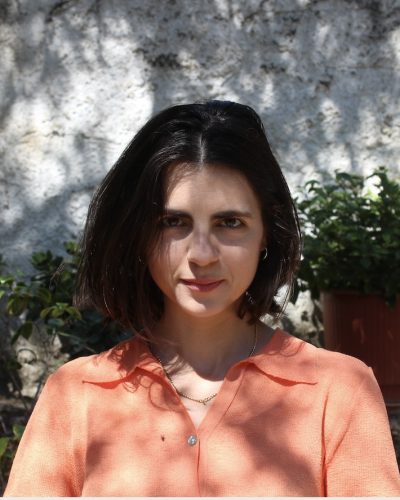c:o/re Junior Fellow 10/22 − 09/23

Kyveli Mavrokordopoulou is a historian of modern and contemporary art, specializing in the relationship between art and science with an emphasis on nuclear technologies. Her interdisciplinary scholarship, at the intersection of art history and the environmental humanities, engages nuclear aesthetics, the visual culture of extraction, and material histories of art and the environment. She was awarded her PhD from the École des Hautes Études en Sciences Sociales, Paris in 2021, supported by an Onassis Foundation scholarship, with a dissertation entitled Dwelling, Extracting, Burying: Nuclear Imaginaries in Contemporary Art (1970-2020). She is an affiliate researcher at the Centre Georg Simmel, EHESS, Paris. She has held visiting fellowships in environmental humanities centres at Carleton University, Ottawa (2018) and VU University, Amsterdam (2019) and was a curatorial fellow of the Stavros Niarchos Foundation (2020-21). Currently, she is working on an exhibition about the atomic age at the Musée d’Art Moderne de Paris (fall 2024).
Uranium Ecologies, in and through Art
Uranium mediates our world in ways that go beyond the production of nuclear energy, civil and military. Its is ubiquitous in lens-based technologies, from x-rays and photographic film to drones for aerial geological prospection. Uranium has produced “ways of seeing” and new aesthetic forms that have undoubtedly come to shape how we come to know nuclear events. Yet the histories of uranium mining have paradoxically remained unseen, with few notable exceptions in the last years. Through a transdisciplinary approach, my aim is to recover the central role of uranium in the culture and politics of the last century, by asking what a history of the atomic age and its artistic expressions looks like when considered through its sheer materiality.
Uranium Ecologies uses contemporary art’s increasing engagement with uranium’s colonial history and mediatic applications to go back in time. This elemental approach resists any purified definition of the element of uranium (per Isabelle Stengers) by weaving contemporary artistic production with an unlikely group of historical objects, namely episodes of antinuclear activism, photographic collections of mining companies, as well as scientific articles and images. This project situates the element of uranium at the junction of interconnected bodies of thought, in particular the history and anthropology of science, media studies and the environmental humanities. Each section analyses a range of artworks that recoup the tactical oversight of uranium in nuclear histories and advocates for engaging with uranium as media in terms of processes, transformation, and events and not simply as conditions of possibility; in other words, to consider the different media uranium “radiates” through. By reading uranium in and through art, this research advances an ecocritical approach that ultimately connects environmental justice to art making.
Publications (selection)
Mavrokordopoulou, Kyveli. 2022. The Possibility of a Situated Nuclear Knowledge: Art in Contaminated Sites. In Toxic Immanence: Decolonising Nuclear Futures, ed. by L. Monnet. Montreal: McGill-Queen’s University Press, pp. 373–383.
Mavrokordopoulou, Kyveli. 2022. Irrésolutions nucléaires. L’art contemporain à l’aune de la nucléarité. In Cahiers du musée national d’art moderne 160: 77–89.
Joo Yun Lee, Katja Kwastek, Chris Lee, Virigina MacKenny, Kyveli Mavrokordopoulou, Jacqueline Hoàng Nguyen, Jennifer Pranolo, Lize van Robbroeck, Pippa Skotnes, James Webb and Carine Zaayman. 2021. Unanticipated Intimacies: A Collective Writing Experiment. In Mix & Stir: New Outlooks on Contemporary Art from Global Perspectives, ed. by H. Westgeest, K. Zijlmans. Amsterdam: Valiz, pp. 97–105.
Mavrokordopoulou, Kyveli. 2019. Digging deeper: On horizontal and vertical landscapes. In NECSUS. European Journal of Media Studies 8: 249–258.
Mavrokordopoulou, Kyveli, de Vos, Ruby (co-editors). 2018. Nuclear Aesthetics. In Kunstlicht 39, Vrije Universiteit.

